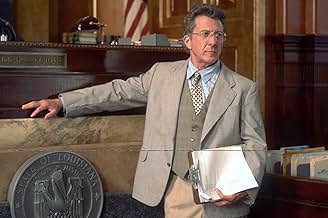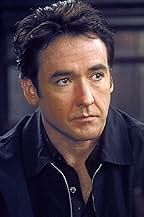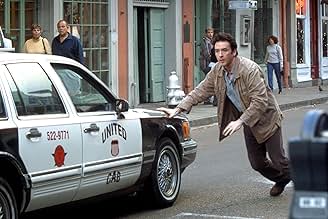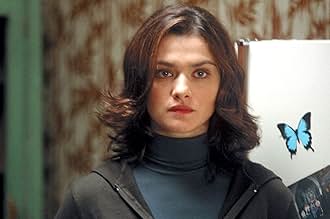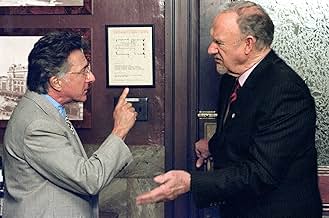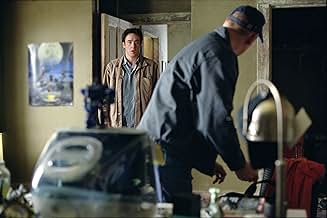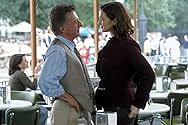Un juré à l'intérieur et une femme à l'extérieur manipulent un procès impliquant un grand fabricant d'armes à feu.Un juré à l'intérieur et une femme à l'extérieur manipulent un procès impliquant un grand fabricant d'armes à feu.Un juré à l'intérieur et une femme à l'extérieur manipulent un procès impliquant un grand fabricant d'armes à feu.
- Prix
- 1 victoire et 3 nominations au total
Sommaire
Reviewers say 'Runaway Jury' is a courtroom thriller featuring a strong cast including Gene Hackman, Dustin Hoffman, John Cusack, and Rachel Weisz. Themes of jury tampering, corporate influence, and ethical dilemmas are prominent. Hackman and Weisz receive praise for their performances. However, the film faces criticism for deviating from John Grisham's novel, particularly the change from a tobacco to a gun control lawsuit. Some find the plot convoluted and unrealistic, though it is generally considered entertaining despite its flaws.
Avis en vedette
Not since Primal Fear have I seen a court room thriller that was really good. Given the actors, I suppose you can't really go wrong. Usually I can find some actor or actress that wasn't very good, bothered me in some way or was flat out horrible. This movie featured superb acting by all those involved. Even Jeremy Piven (who I can't help but picture as the Dean in Old School or his characters from PCU or Very Bad Things) delivered a respectable performance, and very different from the other movies mentioned.
Runaway Jury doesn't throw in a lot of needless plot twists and unexpected happenings just for the sake of throwing off or fooling the viewer. In fact, it pretty much goes in the direction you think it will, with only a couple of exceptions which are needed.
I'm usually the type that likes my movies to get it all done in around 90 minutes or so. Seems to me that most movies that go over 2 hours have a lot of needless "filler" material for no real reason, which, more often than not, results in slow, dragging scenes in the movie or just a boring movie altogether. This particular movie clocked in at just over 2 hours and used every minute wisely. Nothing boring and nothing seemed to drag on forever. I found the beginning with the jury selection particularly interesting. I thought the whole concept of knowing how to get exactly who you want on your jury, even before they actually show up to jury duty, was a little mind blowing. After seeing those scenes, I knew it was going to be a great movie. I highly recommend this movie, especially if you enjoyed movies like Primal Fear, although this is a completely different movie with different kinds of surprises.
Overall, Gene Hackman stole the show in this one and proves why he's been working in movies and television for over 40 years now. I give this 9 out of 10.
Runaway Jury doesn't throw in a lot of needless plot twists and unexpected happenings just for the sake of throwing off or fooling the viewer. In fact, it pretty much goes in the direction you think it will, with only a couple of exceptions which are needed.
I'm usually the type that likes my movies to get it all done in around 90 minutes or so. Seems to me that most movies that go over 2 hours have a lot of needless "filler" material for no real reason, which, more often than not, results in slow, dragging scenes in the movie or just a boring movie altogether. This particular movie clocked in at just over 2 hours and used every minute wisely. Nothing boring and nothing seemed to drag on forever. I found the beginning with the jury selection particularly interesting. I thought the whole concept of knowing how to get exactly who you want on your jury, even before they actually show up to jury duty, was a little mind blowing. After seeing those scenes, I knew it was going to be a great movie. I highly recommend this movie, especially if you enjoyed movies like Primal Fear, although this is a completely different movie with different kinds of surprises.
Overall, Gene Hackman stole the show in this one and proves why he's been working in movies and television for over 40 years now. I give this 9 out of 10.
This review is targeted at those who have read John Grisham's novel and might want to know how the movie compares to the book.
The largest and most controversial difference between the two is that while the trial in the book was about holding tobacco companies responsible for cigarette advertising, addiction, and lung cancer, the trial in the movie is a case of holding firearms companies responsible for encouraging guns to be sold to criminals. While the book centers around the law, as all Grisham novels do, the movie centers around gun control. Therefore, the movie can be quite political. Those who do not appreciate political statements in movies beware.
The movie spends a lot more time on Wendall Rohr and Rankin Fitch, the plantiff's lawyer and the defendant's jury consultant. While Rohr is a flat character hardly mentioned in the book, the movie characterizes him as a man who still possesses some sense of the ideal practice of law. Fitch, pitiable and even slightly likable in the book, is shown as an utterly malicious man in the movie. The members of the jury are definitely not shown much in the movie. We don't get to watch exactly how Nicholas Easter befriends each one individually, and we are told less about each jury member. The psychology that is in the book is largely absent from the movie and replaced with a few scenes of dramatic flair.
The casting of the movie was GREAT. When I heard there was a Runaway Jury movie, I immediately imagined John Cusack as Nicholas Easter. Rachel Weisz, Dustin Hoffman, Gene Hackman, and the actors who play members of the jury are almost as I pictured them as well! Because of this change in theme, the movie is much darker than the book. Extreme violence and arson make their way into jury manipulation. Fitch becomes a much more malevolent character. The ways in which members of the jury are bumped or released from jury duty are much darker than in the book. Little details that were altered to adapt to gun control instead of tobacco are interesting and appropriate. The movie is a different but well-done adaptation. Even if you don't enjoy the movie, it is interesting to compare it to the book.
The largest and most controversial difference between the two is that while the trial in the book was about holding tobacco companies responsible for cigarette advertising, addiction, and lung cancer, the trial in the movie is a case of holding firearms companies responsible for encouraging guns to be sold to criminals. While the book centers around the law, as all Grisham novels do, the movie centers around gun control. Therefore, the movie can be quite political. Those who do not appreciate political statements in movies beware.
The movie spends a lot more time on Wendall Rohr and Rankin Fitch, the plantiff's lawyer and the defendant's jury consultant. While Rohr is a flat character hardly mentioned in the book, the movie characterizes him as a man who still possesses some sense of the ideal practice of law. Fitch, pitiable and even slightly likable in the book, is shown as an utterly malicious man in the movie. The members of the jury are definitely not shown much in the movie. We don't get to watch exactly how Nicholas Easter befriends each one individually, and we are told less about each jury member. The psychology that is in the book is largely absent from the movie and replaced with a few scenes of dramatic flair.
The casting of the movie was GREAT. When I heard there was a Runaway Jury movie, I immediately imagined John Cusack as Nicholas Easter. Rachel Weisz, Dustin Hoffman, Gene Hackman, and the actors who play members of the jury are almost as I pictured them as well! Because of this change in theme, the movie is much darker than the book. Extreme violence and arson make their way into jury manipulation. Fitch becomes a much more malevolent character. The ways in which members of the jury are bumped or released from jury duty are much darker than in the book. Little details that were altered to adapt to gun control instead of tobacco are interesting and appropriate. The movie is a different but well-done adaptation. Even if you don't enjoy the movie, it is interesting to compare it to the book.
Did you ever look at an old photograph that perfectly captures the spirit of people you know, for a fact, are long gone? Did you ever wonder if the people in the photo were self-aware, and knew their best was behind them? The film industry underwent a lot changes at the turn of the century. Changes that had to do with the massive stratification of the delivery channels for product; changes in video technology; the economics of where to make films as cheaply as possible (think Canada, heck, think Cambodia); and the incredible rise of specially-made for TV series as (suddenly) a viable threat the notion that threatre quality invariably beat home TV quality..? This review penned in late 2014 and I just revisited the film. I see it as a example of the best of the best of the old school style of film making and for that reason alone it deserves your special attention.
Novel by Grisham (from an era when people actually read books). A cast to die for. The other reviewers will tell you flat out that Rachel Weisz, Gene Hackman and John Cusack carry the film on their backs, and they do not lie.
Has Gene Hackman ever given a performance that was less than brilliant? His only competition was age. His. Rachel Weisz at the peak of her astonishing career, always mesmerizing, always eye-catching, always making you care. And Cusack when he was still an A-lister, long before he ended up in B movies and his agent started to promote him as the "hardest working man in Hollywood." The film ebbs here and lags there, but it remains a remarkable piece of pure entertainment.
Novel by Grisham (from an era when people actually read books). A cast to die for. The other reviewers will tell you flat out that Rachel Weisz, Gene Hackman and John Cusack carry the film on their backs, and they do not lie.
Has Gene Hackman ever given a performance that was less than brilliant? His only competition was age. His. Rachel Weisz at the peak of her astonishing career, always mesmerizing, always eye-catching, always making you care. And Cusack when he was still an A-lister, long before he ended up in B movies and his agent started to promote him as the "hardest working man in Hollywood." The film ebbs here and lags there, but it remains a remarkable piece of pure entertainment.
Good but a bit disappointing adaptation to the John Grisham thriller does not follow the book the way it should be, and lacks the momentum of the court proceedings that follow. The acting is first rate with Rachel Weisz and Gene Hackman being the standouts in a cast that includes Dustin Hoffman John Cusack, and Bruce Davidson. Weisz and Hackman's performances are of Oscar quality, despite the fact that the movie is not up to their caliber of acting. The setting is a little out of the way, and the pacing is a little off with scenes that go way to fast but the film is ultimately save by the acting by all involved, most of which is credited to Weisz and Hackman.
2 stars for Weisz and Hackman but don't expect anything close to the book.
2 stars for Weisz and Hackman but don't expect anything close to the book.
Decent but very flawed film that has so many points to it that it can't be categorize in simply good or bad.
The Good: Some of the performances are spectacular and deserving of a much better movie than this. Gene Hackman hasn't been this good in ages, and he's one of the few reasons that this movie is watchable. The next reason is Rachel Weisz, who is the only actor Hackman has had in quite some time that is his equal in performance and in acting prowess. She is so good in fact that she does almost steal the film from him and then some. The city of New Orleans is a fascinating setting for this film but wrong because it's not the original setting of the book.
The Bad: Dustin Hoffman is not really in the movie and is really a minor character in the whole story. Which is too bad because he's such a charismatic actor and deserves a much bigger role than what he had. The next problem is the whole spy versus spy angle that makes the whole film into a joke because no one would go that far to rig a jury, especially in a case that would have been thrown out of a real court with the facts that was presented in the film. Which leads to .
The Ugly: The script is really bad. How bad you say? It took almost four writers to outline the story, which bare in mind does not follow the book at all. The dialog is great in places and bad in others, and the whole structure of the film is paper-thin which is easily to blow holes thru. The story runs out of gas in the half way point of the film and the ideas express seems more like a bias view of what the law should be than a realistic view of what the law really is. I think the biggest offence the movie makes is changing the text of the original novel and making about guns other than big tobacco. John Grisham's original novel was hugely entertaining and down right poignant in its views about justice. This film seems like it has not idea where it's at from time to time and lacks a coherent narrative to even try to explain the stuff that is going on right in front of you.
Even with the good points, the bad does out weight the good here. It's a decent film because of the acting of Rachel Weisz and Gene Hackman but they like the viewer are let down with a script that lacks conviction for the subject it covers and a real point of view that expresses the feelings of the reality of the gun issue.
The Good: Some of the performances are spectacular and deserving of a much better movie than this. Gene Hackman hasn't been this good in ages, and he's one of the few reasons that this movie is watchable. The next reason is Rachel Weisz, who is the only actor Hackman has had in quite some time that is his equal in performance and in acting prowess. She is so good in fact that she does almost steal the film from him and then some. The city of New Orleans is a fascinating setting for this film but wrong because it's not the original setting of the book.
The Bad: Dustin Hoffman is not really in the movie and is really a minor character in the whole story. Which is too bad because he's such a charismatic actor and deserves a much bigger role than what he had. The next problem is the whole spy versus spy angle that makes the whole film into a joke because no one would go that far to rig a jury, especially in a case that would have been thrown out of a real court with the facts that was presented in the film. Which leads to .
The Ugly: The script is really bad. How bad you say? It took almost four writers to outline the story, which bare in mind does not follow the book at all. The dialog is great in places and bad in others, and the whole structure of the film is paper-thin which is easily to blow holes thru. The story runs out of gas in the half way point of the film and the ideas express seems more like a bias view of what the law should be than a realistic view of what the law really is. I think the biggest offence the movie makes is changing the text of the original novel and making about guns other than big tobacco. John Grisham's original novel was hugely entertaining and down right poignant in its views about justice. This film seems like it has not idea where it's at from time to time and lacks a coherent narrative to even try to explain the stuff that is going on right in front of you.
Even with the good points, the bad does out weight the good here. It's a decent film because of the acting of Rachel Weisz and Gene Hackman but they like the viewer are let down with a script that lacks conviction for the subject it covers and a real point of view that expresses the feelings of the reality of the gun issue.
Le saviez-vous
- AnecdotesThe much-anticipated bathroom scene in this movie, where Rohr (Dustin Hoffman) confronts Fitch (Gene Hackman) is the first dialogue in a movie between Hoffman and Hackman. It was written while the rest of the movie was being filmed, after someone on the crew found out that the two, though they had been friends since 1956, had never starred in a movie together. It was finally shot on a single day at the end, several weeks after Hackman and Hoffman had finished their other work.
- GaffesThe American Flag is on the wrong side of Judge Harkin, as it is accorded the place of honor, always positioned to its own right, or the speaker's right and the audience's left, according to the United States Flag Code.
- Citations
Rankin Fitch: Gentlemen, trials are too important to be left up to juries.
- ConnexionsFeatured in HBO First Look: Runaway Jury (2003)
- Bandes originalesHappy Birthday to You
Written by Mildred J. Hill, Patty S. Hill
Meilleurs choix
Connectez-vous pour évaluer et surveiller les recommandations personnalisées
- How long is Runaway Jury?Propulsé par Alexa
Détails
- Date de sortie
- Pays d’origine
- Langues
- Aussi connu sous le nom de
- Runaway Jury
- Lieux de tournage
- sociétés de production
- Consultez plus de crédits d'entreprise sur IMDbPro
Box-office
- Budget
- 60 000 000 $ US (estimation)
- Brut – États-Unis et Canada
- 49 443 628 $ US
- Fin de semaine d'ouverture – États-Unis et Canada
- 11 836 705 $ US
- 19 oct. 2003
- Brut – à l'échelle mondiale
- 80 154 140 $ US
- Durée2 heures 7 minutes
- Couleur
- Mixage
- Rapport de forme
- 2.35 : 1
Contribuer à cette page
Suggérer une modification ou ajouter du contenu manquant



